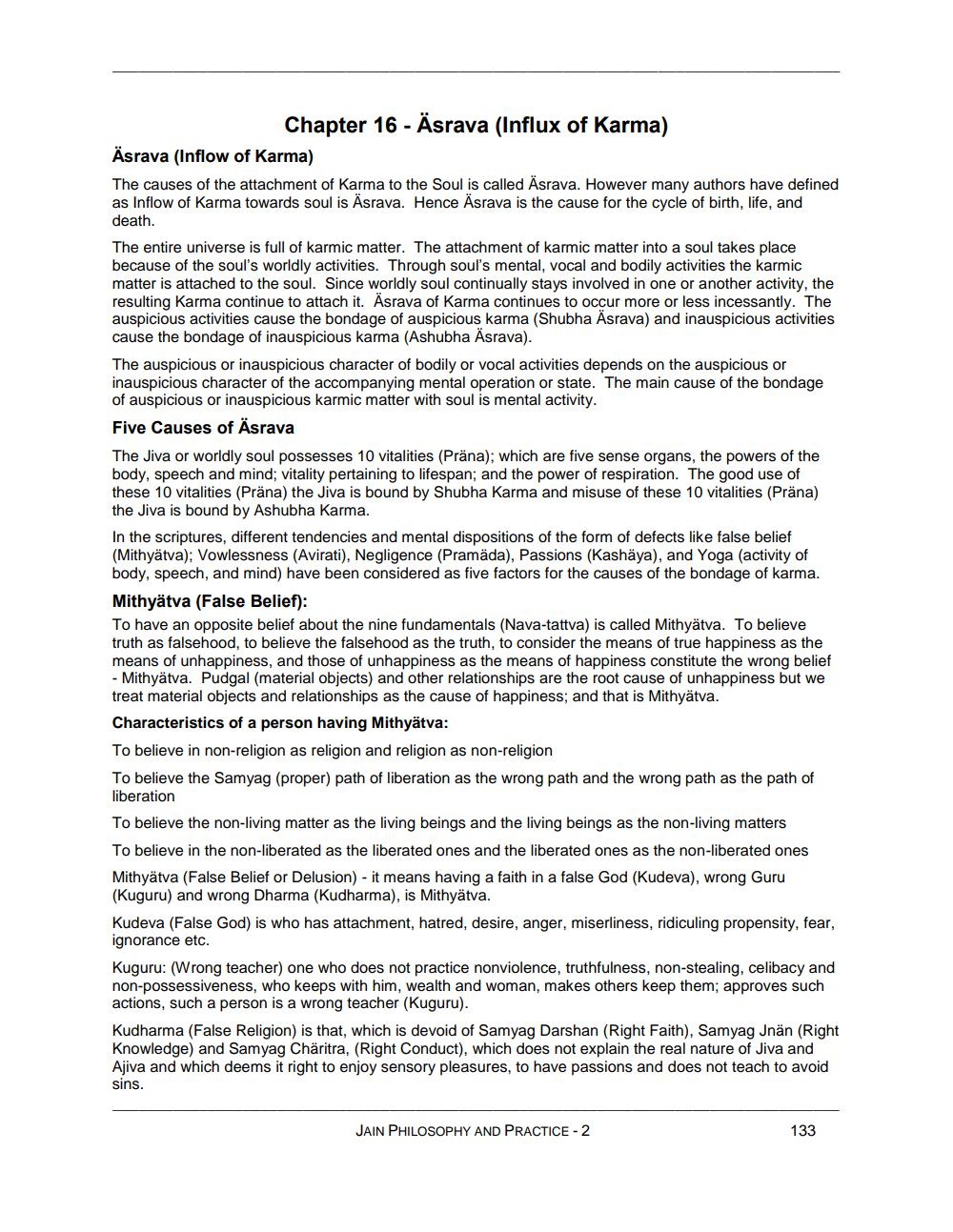________________
Chapter 16 - Äsrava (Influx of Karma)
Asrava (Inflow of Karma)
The causes of the attachment of Karma to the Soul is called Äsrava. However many authors have defined as Inflow of Karma towards soul is Äsrava. Hence Äsrava is the cause for the cycle of birth, life, and death.
The entire universe is full of karmic matter. The attachment of karmic matter into a soul takes place because of the soul's worldly activities. Through soul's mental, vocal and bodily activities the karmic matter is attached to the soul. Since worldly soul continually stays involved in one or another activity, the resulting Karma continue to attach it. Äsrava of Karma continues to occur more or less incessantly. The auspicious activities cause the bondage of auspicious karma (Shubha Äsrava) and inauspicious activities cause the bondage of inauspicious karma (Ashubha Äsrava).
The auspicious or inauspicious character of bodily or vocal activities depends on the auspicious or inauspicious character of the accompanying mental operation or state. The main cause of the bondage of auspicious or inauspicious karmic matter with soul is mental activity.
Five Causes of Äsrava
The Jiva or worldly soul possesses 10 vitalities (Präna); which are five sense organs, the powers of the body, speech and mind; vitality pertaining to lifespan; and the power of respiration. The good use of these 10 vitalities (Präna) the Jiva is bound by Shubha Karma and misuse of these 10 vitalities (Präna) the Jiva is bound by Ashubha Karma.
In the scriptures, different tendencies and mental dispositions of the form of defects like false belief (Mithyätva); Vowlessness (Avirati), Negligence (Pramäda), Passions (Kashäya), and Yoga (activity of body, speech, and mind) have been considered as five factors for the causes of the bondage of karma.
Mithyätva (False Belief):
To have an opposite belief about the nine fundamentals (Nava-tattva) is called Mithyätva. To believe truth as falsehood, to believe the falsehood as the truth, to consider the means of true happiness as the means of unhappiness, and those of unhappiness as the means of happiness constitute the wrong belief - Mithyätva. Pudgal (material objects) and other relationships are the root cause of unhappiness but we treat material objects and relationships as the cause of happiness; and that is Mithyätva.
Characteristics of a person having Mithyätva:
To believe in non-religion as religion and religion as non-religion
To believe the Samyag (proper) path of liberation as the wrong path and the wrong path as the path of liberation
To believe the non-living matter as the living beings and the living beings as the non-living matters
To believe in the non-liberated as the liberated ones and the liberated ones as the non-liberated ones Mithyätva (False Belief or Delusion) - it means having a faith in a false God (Kudeva), wrong Guru (Kuguru) and wrong Dharma (Kudharma), is Mithyätva.
Kudeva (False God) is who has attachment, hatred, desire, anger, miserliness, ridiculing propensity, fear, ignorance etc.
Kuguru: (Wrong teacher) one who does not practice nonviolence, truthfulness, non-stealing, celibacy and non-possessiveness, who keeps with him, wealth and woman, makes others keep them; approves such actions, such a person is a wrong teacher (Kuguru).
Kudharma (False Religion) is that, which is devoid of Samyag Darshan (Right Faith), Samyag Jnän (Right Knowledge) and Samyag Chäritra, (Right Conduct), which does not explain the real nature of Jiva and Ajiva and which deems it right to enjoy sensory pleasures, to have passions and does not teach to avoid sins.
JAIN PHILOSOPHY AND PRACTICE - 2
133




